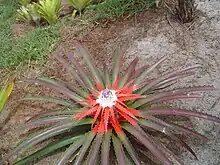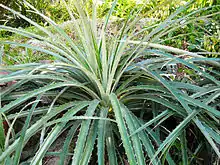| Bromelia balansae | |
|---|---|
 | |
| Scientific classification | |
| Kingdom: | Plantae |
| Clade: | Tracheophytes |
| Clade: | Angiosperms |
| Clade: | Monocots |
| Clade: | Commelinids |
| Order: | Poales |
| Family: | Bromeliaceae |
| Genus: | Bromelia |
| Species: | B. balansae |
| Binomial name | |
| Bromelia balansae Mez | |
| Synonyms[1] | |
| |
Bromelia balansae is a plant species in the genus Bromelia. This species is native to Argentina, Brazil, Colombia, Bolivia, and Paraguay where it grows at elevations of 150 to 3,000 feet.[1][2][3][4]
Description
Bromelia balansae is a large terrestrial bromeliad somewhat resembling the pineapple. Bromelias contain green leaves that grow 2–4 feet long with very sharp spines. When prepared to bloom, the center of the plant becomes bright red and then white prior to releasing an orange fruit - for its flower the plant is known as the "heart of flame". The orange-colored fruit it yields is said to make a cooling drink. It was described as the most commonly cultivated bromelia in a book from the last century and may be used as fencing due to its large and rapid growth.[5] It thrives in full sun and is best suited for growing outdoors.[6]

References
- 1 2 Kew World Checklist of Selected Plant Families
- ↑ Krömer, Thorsten; Kessler, Michael; Holst, Bruce K.; Luther, Harry E.; Gouda, Eric J.; Ibisch, Pierre L.; Till, Walter; Vásquez, Roberto (1 October 1999). "Checklist of Bolivian Bromeliaceae with Notes on Species Distribution and Levels of Endemism". Selbyana. 20 (2): 201–223. ISSN 2689-0682. JSTOR 41760025.
- ↑ Martinelli, Gustavo; Vieira, Cláudia Magalhães; Gonzalez, Marcos; Leitman, Paula; Piratininga, Andréa; Costa, Andrea Ferreira da; Forzza, Rafaela Campostrini (January 2008). "Bromeliaceae da Mata Atlântica Brasileira: lista de espécies, distribuição e conservação" [Bromeliaceae of the brazilian Atlantic Forest: checklist, distribution and conservation]. Rodriguésia (in Brazilian Portuguese). 59 (1): 209–258. doi:10.1590/2175-7860200859114. JSTOR 23499386.
- ↑ BSI Journal V20(4), BROMELIA BALANSAE AND ITS CLOSE RELATIVES Retrieved 3 October 2011
- ↑ Padilla, Victoria (1973). Bromeliads. New York: Crown Publishers. pp. 42. ISBN 0517562413.
- ↑ Kramer, Jack (1976). Bromeliads The Colorful House Plants. Litton Educational Publishing, Inc. pp. 90, 100. ISBN 0-442-24518-1.